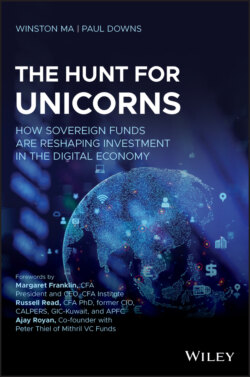Читать книгу The Hunt for Unicorns - Winston Ma - Страница 17
Preface
ОглавлениеWho holds the power in financial markets? For many, the answer will probably be the large investment banks, big asset managers, and hedge funds that are often in the media's spotlight. But increasingly a new group of sovereign investors, which includes some of the world's largest sovereign wealth funds, government pension funds, central bank reserve funds, state-owned enterprises, and other sovereign capital-enabled entities, have emerged to become the most influential capital markets players and investment firms, with $30 trillion in assets under management (“super asset owners”).
Importantly, the rise of sovereign investors is reflected not only in the increase in the size of assets under their management but also in the proliferation of new funds established over the past decade and the anticipated establishment of new funds in countries with recent resource wealth (such as African countries), as well as in regions striving for government-driven economic transformation (e.g., the EU).
Their ample resources, preference for lower profile, passive investing, their long time horizon and adherence to sustainability, as well as their need to diversify globally and by sector, have helped to transform the investment world and, in particular, private markets for digital companies. They have helped create and sustain an environment that has fostered the rise of the likes of Uber, Alibaba, Spotify, and other transformative players in the digital economy, while providing their founders and business models the benefit of long-term capital.
Despite this increasingly important impact, sovereign investors remain mostly unknown, often maintaining a low profile in global markets. For the same reason, they're also among the most widely misunderstood investors, as many view investments made by sovereign investors as purely driven by political aims. The general perception is that most sovereign investors lack transparency and have questionable governance controls, causing an investee nation to fear exposure to risks of unfair competition, data security, corruption, and non-financially or non-economically motivated investments.
As this book goes to press, the pandemic raging around the globe has brought them again to the front pages. Sometimes it's their key role in fostering the rise of the tech unicorns of artificial intelligence (AI) and big data and their big bets on biotech startups searching for treatments and vaccines. More frequently, it's coverage of their role as economic superheroes called upon to rescue the global economy or as comic book villains scooping up Western champions the pandemic has made vulnerable. These simple caricatures do not reflect reality, of course. Revealing the complex reality behind these simplistic depictions is the task of this book.
The current global tensions around the AI race and tech competition – and now the corona virus pandemic – have exacerbated such misperceptions, spawning controversies around sovereign investors and capital markets, governments, new technologies, cross-border investments, and related laws and regulations (see the chart below):
As such, sovereign capital and the global digital economy are undergoing an unprecedented, contentious moment. This book maps the global footprints of these super asset owners; in particular, the three intersecting aspects of their pursuit of digital revolution: their strategy and institutional setup, their investments and impact, and regulatory policy responses.
This book is organized as follows.
